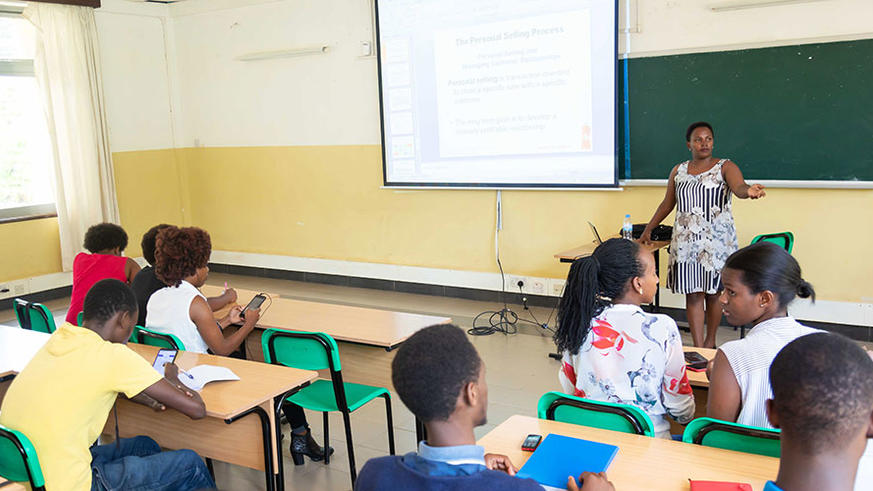University and tertiary level education students will soon have an alternative to bank loans to finance their education following the debut of Chancen International to the Kigali International Finance Centre.
Chancen International is a social impact investor with focus on tertiary education and works to avail financing for young people in Africa to access quality education.
The model of higher learning financing is called an Income Share Agreement and was pioneered in Germany before being introduced in East Africa in 2018.
The development will see Chancen invest in Rwanda and provide support to low-income background students by offering a new financing option to typical bank loans.
Ordinarily, students in public varsities are eligible for student loans disbursed and managed by the Development Bank of Rwanda.
However, students in private institutions and other tertiary institutions often have to seek bank loans, save up or liquidate family assets for higher learning.
In response to the challenge, Chancen is setting up a Special Purpose Vehicle aimed at collecting funds from various investors.
Batya Blankers, Cofounder and Chief Executive of Chancen International said that they are domiciling the fund in the Kigali International Finance Centre.
To finance the growth of its model, she said that Chancen developed the Future of Work Fund to finance 10,000 students over the next 3 years and show financial sustainability of the model at an early scale stage.
“Through its innovative Income Share Agreement (ISA) model, Chancen is increasing access to high-quality tertiary education for youth in Rwanda in alignment with the Sustainable Development Goals around Quality Education (SDG 4), Decent Work and Economic Growth (SDG 8), and Reduced Inequalities (SDG 10). To finance the growth of its model, Chancen developed the Future of Work Fund to finance 10,000 students over the next 3 years and show financial sustainability of the model at an early scale stage,” she said.
“Chancen decided to domicile the fund in the new Kigali International Finance Centre because it supports their impact-driven approach,” Blankers said.
The product is expected to contribute to increasing the total asset under custody in Rwandan banks coming from investment funds, offering more liquidity to finance the local economy.
Experts say that the compliance and the sustainability positioning of KIFC made it possible for the “Future of Work Fund” to receive its first investment from a social impact investor, which is proof of growing attractiveness of value proposition.
The choice of KIFC as the ‘home’ of the African fund targeting Rwanda, market commentators say is a sign of confidence in the regulatory framework being set up.
Lise Arakaza, Business Development Manager, Rwanda Finance Limited told The New Times that the establishment of Future of Work Funds in KIFC is a game changer providing direct financing to students in need of financial resources without additional burden to their families.
The fund business model is unique because no traditional collateral is required to secure the financing.
“Kigali International Financial Centre is playing the role of connector between the real economy and investors proving the importance of promoting the value proposition of our financial ecosystem domestically and internationally. Students are able to receive financing because investors believe in the quality of the tertiary education received from the partners institutions, believe in the interest of private companies to hire the right talents and because they trust the predictability of our financial ecosystem,” she said.
This impact could be increased with more investment to build more high quality tertiary education institutions in the country and more jobs created in the services sector, she added.
The development was among other things propelled by key incentives outlined in the regulatory framework.
Ntoudi Mouyelo, the Chief Investment Officer at Rwanda Finance Limited, said that incentives that facilitated the set-up of the investment vehicle in KIFC include incentives on the capital flow between the fund and the investors together with the tax treatment of their future cross border investment in larger economies.
“Once the fund’s income is taxed in Rwanda in line with the fund activities, it is important for investors to enjoy a free repatriation of their benefit. The question should be around the treatment of an income that must pay its fair contribution for using Rwanda business and financial ecosystem while being attractive for more investment in the country,”
“It is first the compliance, ease of operations and impact driven positioning of KIFC that facilitated the set-up of the SPV. We are not competing based on the level of the incentives but we are making sure that our incentives are at par with other financial centres that are complying with international standards,” he added.
The fund has since received its first investment capital in a local bank, and is awaiting the final approval from the Central Bank to operate and disburse the funds with the launch of the fund activity expected in coming weeks.
Chancen is one of multiple pioneer investors and members in the Kigali International Finance Centre.
Others include a mortgage firm, Westbridge Mortgage exploring future operations in Rwanda, still pending licensing approval from the relevant authorities

